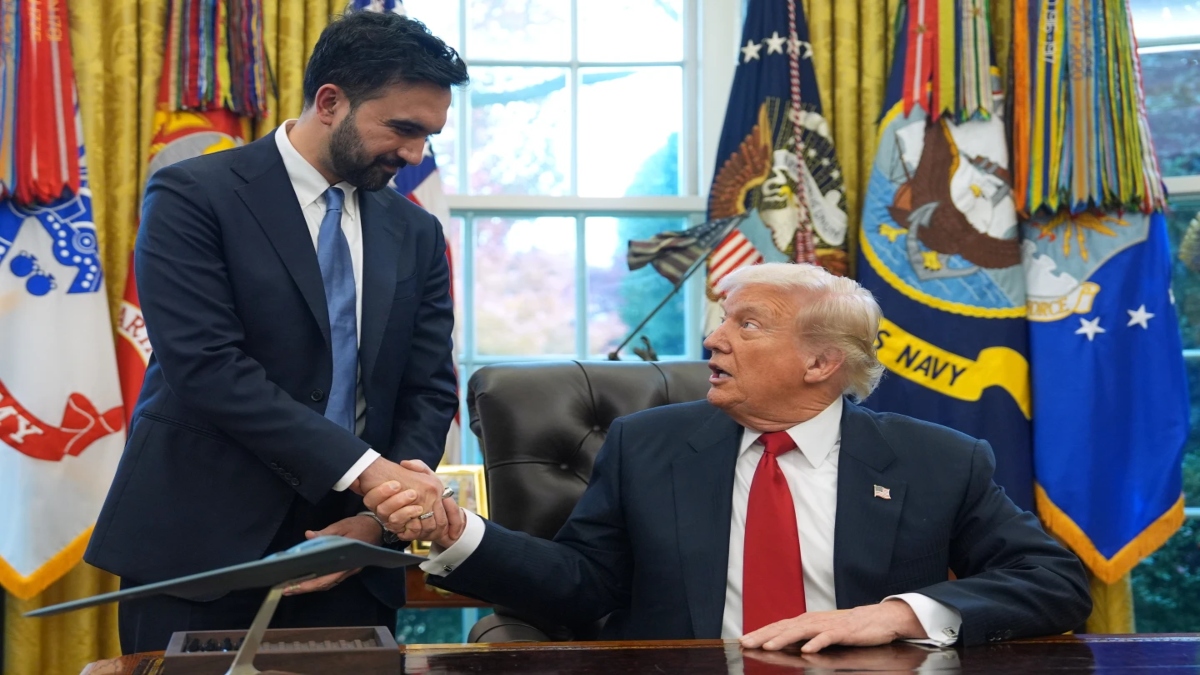When Zohran Mamdani, the new Mayor-designate of New York City, came a-calling on President Donald J. Trump at the Oval Office in the White House on November 21, everyone thought that sparks would fly. Going by how bitterly both, especially the former, have lambasted each other, nothing of that kind happened. Both men, once cast as inveterate antagonists, if not political rivals, were seen smiling on camera. The atmosphere, by all accounts, and the optics, were almost cordial.
What gives?
The answer is simple. In the cutthroat arena of politics, principles often take a backseat to practical gains. Longstanding rivals can swiftly pivot to collaboration when it serves even their seemingly contradictory agendas. Power is the only thing that matters—even if, in the competitive populism sweepstakes, the players are sworn antagonists.
This dynamic was on full display in Washington, where President Trump hosted New York City’s incoming mayor, Zohran Mamdani. After their Friday sit-down at the White House, both seemed to have put a halt—at least temporarily—to their acrimonious and longstanding feud. “I’m optimistic he’ll handle things well,” Trump remarked to the press post-meeting. “He might even win over some sceptics on the right.”
Wow! What just happened there?
The duo steered clear of public barbs under the glare of live TV lights. “The president’s time was valuable,” Mamdani noted, positioned beside Trump at the celebrated Resolute Desk. The massive, historic, and elaborately carved double-pedestal partners’ desk is so called because it was made from the timbers of HMS Resolute, the erstwhile British Royal Navy ship. Gifted to then-US President Rutherford B. Hayes in 1880 by Queen Victoria, it has borne witness to many an unforgettable meeting of leaders.
Quick Reads
View AllThis too was one, especially given that Mamdani is New York City’s first Socialist mayor and the youngest man in over a hundred years to occupy the office. And Trump, a New Yorker himself and once a Democrat to boot, earned his fame and fortune in the Big—I might add, Bad—Apple. Though he subsequently moved residence to Mar-a-Lago in sunny Palm Beach, Florida, once a New Yorker always a New Yorker, right?
When Mamdani was grilled on his past labelling of Trump as a tyrant, the president shrugged it off with humour: “I’ve been called much worse than a despot, so it’s not insulting.” And when the fascist query arose, as it inevitably would—Mamdani having branded Trump what is the worst possible expletive in the Communist playbook—Trump bailed out a might-have-been embarrassed Mamdani again: “That’s OK. You can just say ‘yes.’ It’s easier than explaining it. I don’t mind,” he added, giving Mamdani’s hand a light pat.
This rapprochement underscores how political operators prioritise mutual benefit over ideological clashes, turning potential conflicts into opportunistic alliances. Mamdani departed the capital having neutralised Trump’s earlier vow to slash federal aid to the nation’s largest metropolis, thereby averting a fiscal catastrophe. What did he yield in return? A promise not to levy extortionate taxes on the rich? Or not to let the criminals run amok in the world’s financial capital?
Who knows?
Meanwhile, Trump smoothed relations with a rising star amid his own dipping approval ratings. As an extra boon, Trump waved away fears from affluent New Yorkers and GOP voices that Mamdani would upend the city, affirming he’d be at ease residing there—“and I think much more so after the meeting”. No surprise. Credit-hogging comes naturally to Trump.
The two men—the older one from glitzy Manhattan, the younger upstart from fashionably upmarket Brooklyn—have built formidable fanbases by championing diametrically opposed visions of America. Even leveraging each other as perfect adversaries to rally their crowds. It was a sign of the political maturity of both that they dialled back their acerbic rhetoric in a nod to realpolitik.
Mamdani, a self-described socialist who surged from anonymity this year preaching accessible living and skimming off the rich, repeatedly faced Trump’s barbs branding him a red menace and bigot. The president had warned of yanking funds and sending in troops if Mamdani triumphed, while throwing support behind centrist Democrat Andrew Cuomo, the ex-governor and Mamdani’s chief opponent.
On his end, the 34-year-old mayor-to-be had revelled in provoking Trump, dubbing him an autocrat, even a despot. In his recent victory address, he taunted: “Donald Trump, since I know you’re watching, I have four words for you—turn the volume up!” But since clinching the win, Mamdani, all set to assume office come New Year’s Day, has adopted a pragmatic stance, pledging bipartisanship. He even phoned Senate Minority Leader Chuck Schumer (D-N.Y.) for tips beforehand, per an insider.
The agenda centred on New York’s soaring living costs, a pain point Mamdani argued bridges his base and Trump’s. GOP insiders and advisers have nudged the president to tackle inflation head-on, cautioning that ignoring it could spell midterm wipeouts if folks feel overlooked.
What is the lesson in all this? It’s an old one. Politics is the art of deal-making. Not only Trump, but it appears his socialist critic and rival Mamdani too, is good at it. No matter what those who wield it say, power trumps ideology— not once or twice but almost each and every time. Nothing new about that, right? The ordinary folks who cast their votes in good faith are as familiar with that truism in the US as they are in Bharat.
But, as we say, “picture abhi baki hai”.
(Makarand R. Paranjape, author and public intellectual, is currently Sri Aurobindo Chair, Vedere University & Director of Education, AHCP LLC. Views expressed in the above piece are personal and solely those of the author. They do not necessarily reflect Firstpost’s views.)


)

)
)
)
)
)
)
)
)



